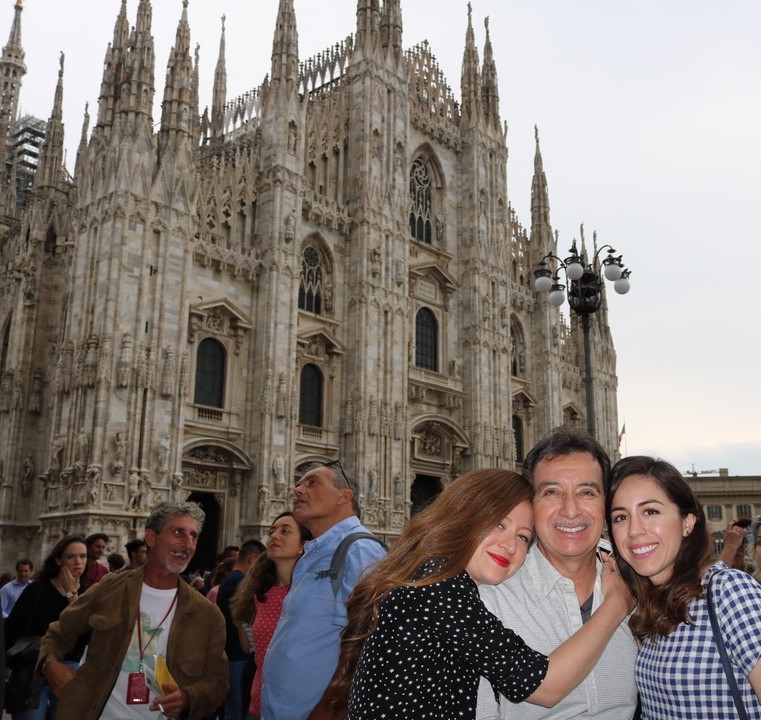Your full title as you’d like it to appear.
Adrian Rendon MD, PhD
Professor of Medicine, Pulmonary/Critical Care Division
Autonomous University of Nuevo León

- Three statements about you – two true, one false.
Do you think Dr. Rendon:
- Loves running marathons and racing in all kinds of triathlons?
- Has visited all the continents of the world?
- Gave his first oral presentation at an ATS Conference when he was 31 years old?
- Give us your “elevator pitch biography.
I am a Mexican Pulmonologist who lives in Monterrey, the second largest city of Mexico. My training in Internal Medicine and Pulmonary and Critical Care Medicine was done at the University Hospital of Monterrey. After that, I spent an extra year at the University of Arkansas for Medical Sciences, where I was specially trained in tuberculosis. When I returned to Monterrey, I became a professor of medicine and have been teaching and doing research here for over 30 years. I am the director of a Center of Excellence for TB, where we’ve been pioneers in developing and applying novel policies to fight TB.
I have earned several honors: I was first of my class in medical school, chief of internal medicine residents and pulmonary fellows, and received my PhD degree with summa cum laude. I have reached the highest level of the National System of Researchers and I am a member of the National Academy of Medicine.
I’m currently an advisor for the national TB program in Mexico and a member of the regional Green Light Committee of the Pan American Health Organization, the Regional Office for the Americas of WHO. I just completed my term as the president of the Mexican Pulmonary and Thoracic Surgery Society and was elected to be the president of the Latin American Thoracic Association or ALAT from 2024 to 2026.
The first ATS Conference I attended was in San Francisco in 1993, with 10,803 attendees! I was surprised by the large attendance and by the enormous amount of scientific research presented. That experience was an eye opener that further influenced the development of my career.
Since then, I’ve attended most of the conferences presenting scientific research, learning pulmonary medicine, and making friends. I’ve proudly become partners with recognized American pulmonologists and researchers, such as Michael Iseman, MD, Joseph Bates, MD, Antonino Catanzaro, MD, among others, and together we’ve developed very interesting binational projects. I have also participated in the ATS Pulmonary infections and Tuberculosis Assembly since 1994.
I am very proud of my role as a mentor to young residents and fellows who have become recognized clinicians and succeeded as independent researchers.
- What would you tell yourself as an Early Career Professional?
Do not see your training or your practice as a work to do. Think of it as an opportunity to learn, to apply knowledge and to develop something. Look for something new and needed that is exciting for you.
In other words, find your passion and when you do, work hard to master it. If you pursue it with a plan in mind, you will be closer to reaching it.
- If you weren’t in medicine, and were in a different industry altogether, what would you be?
I would love to work in something related with endurance sports, designing training programs, nutrition and recovery plans, and coaching on tracks and roads. Working with kids and seniors would be very gratifying for me.
- What is your favorite way to spend a day off?
If it’s just a day or a weekend off, staying at home with my wife recharging batteries is more than enough. Running and riding my bicycle are part of my daily routines. If I had more time, my favorite activity would be to visit my two successful daughters: the dermatologist who lives in Heidelberg and the periodontist in Bologna.
- What areas of medicine are you most excited to see develop?
Finding the intricate way genetics, immunology and environment are connected and how they influence the balance between health and disease would be a major advance in all medical fields. With that knowledge, we would be very close to effective preventive and/or precision medicine.
- What is one advancement in your field you’d like to see in your career?
I would die happily if the global approach we’ve had for COVID-19 would be applied to an ancient pandemic that has been the number one killer in the history of mankind: tuberculosis, which is affecting all countries including the high-income ones. Despite being aware of all the morbidity and mortality related to TB, governments all over the world have neglected what is needed to at least stop TB from spreading. Funding is needed to perform TB research. Political engagement is necessary to reach the goals and policies the TB program must comply with. We need an effective vaccine, we need shorter treatments either for sensitive or resistant TB, preventive therapy is almost nonexistent in many countries, diagnostic tests are expensive and far from the point of care, , etc. COVID-19 aggravated all the fails that TB control already had before the pandemic.
The approach to control TB should be global, otherwise we will keep losing terrain in the battlefield against the white pest.
- Which statement did you make up?
I have not been to all continents. I’ve been to five of them: Europe, Asia, Oceania, Africa, and America, of course, but I haven’t been able to visit Antarctica yet though I’m planning to do so soon.

